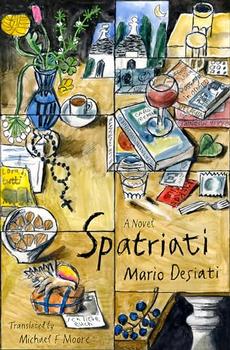
A Novel
by Mario Desiati
Following two outcasts' tumultuous friendship, this brilliant, Strega Prize–winning novel captures the probing, passionate nature of a generation of global citizens, exploring sexuality and identity.
I never understood, of the two of us, which one was warm and which cold, but I consider myself lucky to have met my opposite front in Claudia Fanelli, the spatriata, the name people around here use for the uncertain, the odd, the unclassifiable and sometimes the shiftless or orphans, as well as unmarried men or women, vagrants and vagabonds, or even, in the case that concerns us, the emancipated.
Claudia enters Francesco's life on a sunny morning, in the school's entrance hall: it's a bolt of lightning, the birth of an entirely new kind of desire, which is, above all, the desire for life. Claudia is peerless and self-assured, extravagant; Francesco is introverted, burning with erotic curiosity, dominated by rustic faith, uncertain. She provokes him: "Did you know that your mother and my father were lovers?" But in the eyes of that meek boy, she glimpses a spark of rebellion: she sees herself in him. They become adults together, in a symbiotic game of escape and pursuit, in which they always end up finding each other.
Mario Desiati captures the complexities of a fluid, uprooted generation: his own. A generation around forty years old today, who weren't afraid to stray far from home to find their place in the world, who truly feel like citizens of Europe. With a poetic yet biting style, capable of great tenderness, Desiati depicts the myriad forms that desire can assume when given free rein. Without any fear of plucking the chords of romanticism, without any false modesty as he delves into the coarsest details of sensuality and instinct.
"An ode to the young, irregular, irreverent generation…combines the poetry of love with the harshness of an internal struggle…between the desire to stay in the small Apulian town where Claudia and Francesco were born and the dream of escaping to a lively, cosmopolitan Europe." —Elle (Italy)
This information about Spatriati was first featured
in "The BookBrowse Review" - BookBrowse's membership magazine, and in our weekly "Publishing This Week" newsletter. Publication information is for the USA, and (unless stated otherwise) represents the first print edition. The reviews are necessarily limited to those that were available to us ahead of publication. If you are the publisher or author and feel that they do not properly reflect the range of media opinion now available, send us a message with the mainstream reviews that you would like to see added.
Any "Author Information" displayed below reflects the author's biography at the time this particular book was published.
Mario Desiati, originally from Martina, Italy, is the author of eleven novels, including his English debut, Spatriati, which received Italy's most prestigious literary award, the Strega Prize. His novel Il paese delle spose infelici is the basis of Pippo Mezzapesa's film of the same name; his novel Ternitti was a finalist for the Strega Prize. His books have been translated into thirteen languages. He lives in Apulia, Italy.
Your guide toexceptional books
BookBrowse seeks out and recommends the best in contemporary fiction and nonfiction—books that not only engage and entertain but also deepen our understanding of ourselves and the world around us.